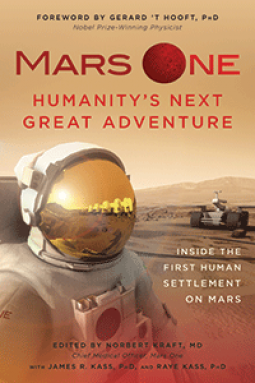
Mars One: Humanity's Next Great Adventure
Inside the First Human Settlement on Mars
by Edited by Norbert Kraft, MD, with James R. Kass, PhD, and Raye Kass, PhD
This title was previously available on NetGalley and is now archived.
Send NetGalley books directly to your Kindle or Kindle app
1
To read on a Kindle or Kindle app, please add kindle@netgalley.com as an approved email address to receive files in your Amazon account. Click here for step-by-step instructions.
2
Also find your Kindle email address within your Amazon account, and enter it here.
Pub Date Feb 23 2016 | Archive Date Apr 07 2016
Description
In 2013, Mars One announced their intentions to establish a permanent human settlement on Mars beginning as early as 2024; they launched their astronaut selection program and received thousands of applications. In 2015, a documentary reality series will give the world a window into the captivating details of the crew selection and training process.
Mars One: Humanity's Next Great Adventure, timed to release alongside the show, explores the various human dimensions of Mars One’s planned expeditions to Mars. Edited by Norbert Kraft, MD, Mars One’s Chief Medical Officer and head of crew selection and training, and James R. Kass, PhD, and Raye Kass, PhD, the other two members of the Mars One crew selection and training committee, the collection of scientists, psychologists, historians, and others provides a behind-the-scenes look at the process and criteria used to choose candidates, as well as fascinating details about their future life on Mars.
What essential skills and training with the Mars One astronauts need to get to and then survive on Mars?
What combination of genders and ages make for the most effective four-person crew? How do individuals’ cultural backgrounds factor in?
Will settlers be able to communicate with Earth?
What can the Mars One mission learn from past periods of human exploration?
What are the complexities of a group of four, and ultimately hundreds, operating with complete independence from human societies on Earth?
What are the psychological ramifications of knowing your actions are being watched by millions of people? What does Mars One hope watching the process will mean for viewers at home?
The book also includes excerpts from official Mars One documents, including candidate questionnaires, and excerpts of letters from prospective crew members.
Available Editions
| EDITION | Paperback |
| ISBN | 9781940363837 |
| PRICE | $16.95 (USD) |
Average rating from 18 members
Featured Reviews
I received this advanced copy through NetGalley for an honest review. (Librarian MS.P)
"Mars One" takes a very human approach to the incredible science behind the almost Sci-Fi mission to colonize Mars.
This was a much cooler book than I was expecting. From the description it seemed too analytical of just about everything about the Mars One Project. But the book is broken down into a easy to read, but still informative selection of information on what the astronauts to Mars will endure before and after the trip.
One of my favorite features are the excerpts from official Mars One documents.
I would highly recommend this book to anyone that is interested in futurism and or astronomy.
 Paul M, Reviewer
Paul M, Reviewer
Think about this: in our lifetimes, a human settlerment will be established on Mars. Science fiction is becoming science fact! My parents and grandparents, when they were children, probably couldn't have imagined men walking on the surface of the moon, much less Mars. The team at Mars One is in full preparation mode to send the first group of settlers to Mars in ten short years!
To give some background, and to look forward to the task at hand, Norbert Kraft, Mars One Chief Medical Officer, has edited Mars One: Humanity's Next Great Adventure. Space travel insiders, including some involved in Mars One, have written a collection of essays about the realities of a one-way mission to Mars.
Here's what impressed me about Mars One. This isn't a speculative book. It's real. The selections are written by people who have worked in space exploration and development, who have trained astronauts, who have led missions, and who have technical, scientific, and personal experience with space exploration. This is not sci-fi.
Interspersed among the essays are short selections quoting Mars One applicants. The astronauts selected for a one-way trip to establish a human presence on Mars will be heroes. I appreciated hearing their thoughts about leaving Earth behind and establishing a human legacy on a new world.
One interesting part of Mars One's plan is taping a reality show of the selection and training of the astronauts, as well as of the mission itself. I was reminded of John Olson and Randy Ingermanson's novel Oxygen, which is the closest portrayal I have read to the mission Mars One envisions. Their mission was broadcast for general consumption, and partially funded by network ad revenue. Oxygen was first published in 2001, but anticipates many elements of Mars One's plan.
Mars One will make a believer out of you. It's not the most gripping reading (the essays are largely written by science Ph.D.s, after all), but reading about Mars One with the knowledge that these are real people making real plans to send a group of astronauts to Mars is beyond cool. I can hardly wait to see Mars One succeed in their mission.
Thanks to NetGalley and the publisher for the complimentary electronic review copy!
 Sheryl J, Reviewer
Sheryl J, Reviewer
Science fiction or fact?
I've never been one to dwell on mortality but I must say this book got me thinking it would be nice to live well into the future in order to see what we do and where we go as a species. And if the Mars One Project has things their way, we'll be colonizing Mars in short order.
“Imagine . . . what it would be like to live on another planet, millions of miles from Earth, and look up into the night sky, knowing that one of the 'stars' is actually the planet on which you were born.”
Really. Imagine it.
We are told that in 2013, nearly 250,000 people applied to the Mars One Project to make the one-way trip to become Mars colonizers. In the back of the book, however, we're told, “the total number of fully and correctly completed applications was 4,227.”
The Mars One Selection Committee whittled that number down to just 100. In 2016, the pool will be further reduced to 24 participants (12 women and 12 men). It is members of that selection committee who provided the essays in this enthralling anthology.
Interspersed throughout are quotes from Mars One applicants offering tidbits of insights into what those potential pioneers are thinking. One applicant said, “for the longest time, all I ever wanted to be was an astronaut. I wanted to sail through the inky black unknown and land, explore, and survive on a place like Mars.”
This collection of essays covers a wide range of topics, beginning with the need for skills. The plan is to send four people to Mars and then four more, every 26 months. It's pretty obvious that those people will need to have a wide range of skills but one of the most important traits will be the ability to innovate. To hack what you have. To think creatively. “Your instinct for innovation will settle the solar system.”
The essays address sociological and psychological issues such as personal differences (age, race, ethnicity, religion), leaving everything and everyone behind, group dynamics, building a society, and even the potential legal issues with colonizing another planet.
The essays also deal with the impact of being under constant surveillance by the world – because The Mars One Project includes plans for reality television that will document the rest of the selection process, with the remaining candidates being recorded throughout their training (presumably, the next ten years). It's even possible that those trainees will have their gall bladders and appendixes removed prophylactic-ally sometime in the next ten years to lessen the possibility of needing acute surgery on Mars (all astronauts will be trained in basic medical and dental procedures but they'd like to avoid major surgery).
The authors say that their program won't be the typical reality television show. Since I've never really watched much reality television, I won't be able to judge that. But the authors add, “participants will rank the order, at the end of each selection day, of the three teammates with whom they want to continue.” And, “the reward for the winners will not be money, but further education and training . . .”
There are also two pieces of short fiction based on the Mars One Project long-term plans, as well as details about the 100 current trainees – demographic statistics and professions.
The book doesn't cover any hard science. Yes, the authors tell us that water will be pull out of the soil and that the settlers will grow their own food and create their own fuels by splitting molecules of water. (As a gardener, I find it difficult to believe they will get enough calories for four people out of 861 square feet of garden space.)
But what about getting there? So far, there is no rocket capable of flying to Mars. And there are plenty of naysayers (including a group at M.I.T.) when it comes to this project. So is it science fiction or fact? Time will tell. As one Mars One applicant said, “whether or not this project succeeds, it has done so much already in sparking interest.”
One very telling line of the book to me is this, “enabling the ability to imagine life on Mars, so as to properly prepare for it, is the most important project the Mars One organization is currently engaged in.” You have to first imagine it. I recommend you start with this book.
I wish to thank BenBella Books, Inc. for the electronic Advance Reader's Copy of Mars One: Humanity's Next Great Adventure.
 Michelle M, Librarian
Michelle M, Librarian
Nonfiction Adult You’ve probably heard about the Mars One project to set up a human colony on Mars. When applications opened, more than 200,000 people signed up, spawning many conversations, I’m sure, between spouses, parents and children about whether they would support the other’s desire to sign up! From this astonishing number, 100 candidates were selected, known as the Mars 100. From this, a final cohort of 24 will emerge after group dynamic challenges and isolation tests, and those 24 will spend the next 10 years preparing for the lifelong mission, with the first crew to depart Earth in 2026. This book is a collection of articles that explores what the colonists will need to know to succeed in the one-way mission. The book is organized into four sections, each one introduced by the editors, James Kass and Raye Kass along with Kraft. Within the section, experts tackle different aspects of the questions, giving readers an understanding of the issues and considerations, all referenced with endnotes. Section 1, Technical and Medical Skills, Health and Fitness, addresses the skillset needed for the colonists to manage emergencies and health issues during the lengthy voyage from Earth to Mars, and in order to set up the colony once they’ve landed. Remember, it’s a seven-minute communication delay between Earth and Mars. Section 2, Culture, Cohesion, and Compatibility, explores gender and age questions along with culture and group skills. Section 3, With the Whole World Watching, addresses the fact that this entire project is being documented and broadcast as a reality TV show. I found the last section the most fascinating – it looks at Life on Mars, examining the political and legal issues of an off-Earth colony, living conditions and quality of life, and finally, a science fiction author’s musings on what leisure life may be like on the Red Planet. The Mars 100 is gender balanced and includes four Canadians (three of them women); their ages today range from 20 to 60. You can see profiles of each candidate at the Mars One website, and they were also interviewed for this book, with quotes from applicants providing an insider’s perspective of each issue. It wraps up with a timeline of the mission, and a brief summary of each part of the selection process, challenges, and training. The next round of selection is in September 2016, and will whittle the number down to 40. Mars One is very accessible reading; in fact, space geeks will wish for more technical detail. As with astronaut Chris Hadfield’s first book, there is also a lot here for supervisors and managers! Section 2 is all about the importance of valuing diversity in teams, and how to bring a group to a better decision without hurting feelings along the way, or succumbing to biases against age or gender. That’s important in a workplace – imagine how important it will be in the tiny confines of the Martian habitat, where the goal is not just to colonize but to create a more egalitarian society at every level, one that is “a head taller” than the one left behind (127). A fascinating look at an audacious project. My thanks to publisher Ben Bella for the advance reading copy provided through NetGalley, in exchange for my honest review.
More discussion and reviews of this book: http://www.goodreads.com/book/show/29056868. I also found the Mars One website captivating reading.
Mars One is a non-fictional account, documenting the start of the Mars One mission, which plans to launch four people into space to embark on the project of colonizing Mars, in 2026.
I found the title slightly misleading, as the book has little to do with the actual planet and more to do with issues such as sexism, gender roles and emotional intelligence. These issues are discussed generally and in comparison to the Mars One mission. Moments in history, associated with travel and the colonization of our own planet, are used as reference points and a tentative guide of how the future space travelers will likely act and react to their new surroundings. For this reason this brilliant non-fiction book, I believe, can be enjoyed by those with little to no interest in space science or the mission indicated. It is more an account of self-discovery, the progress of the human race, a history of technological advancement and our incessant quest for knowledge.
This book includes a myriad of articles surrounding subjects such as the required emotional intelligence of the candidates, the physical training they will endure and their thoughts and opinion on the life they are to leave behind. It is dense with fact and highly informative, yet told in a relatively simplistic tone that belies confusion and bogging down, under the weight of the overload of information.
This book held special value to me as I am currently writing my own first novel, which is a science fiction, dystopian YA set on, you guessed it, the planet Mars. Whist giving me little new information about the actual Martian setting that I did not already know, it made me think about factors that had not yet entered my consideration, relating to the new terraforming settlers.
 MARY P, Bookseller
MARY P, Bookseller
A great account of a great expreriment, soon to be reality (hopefully)











